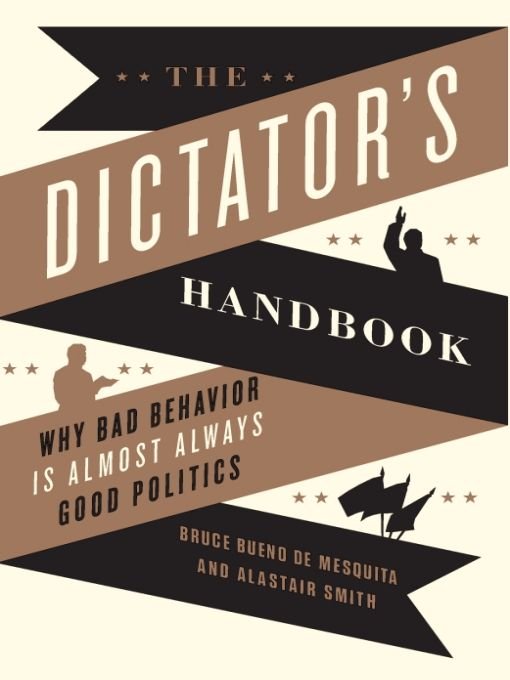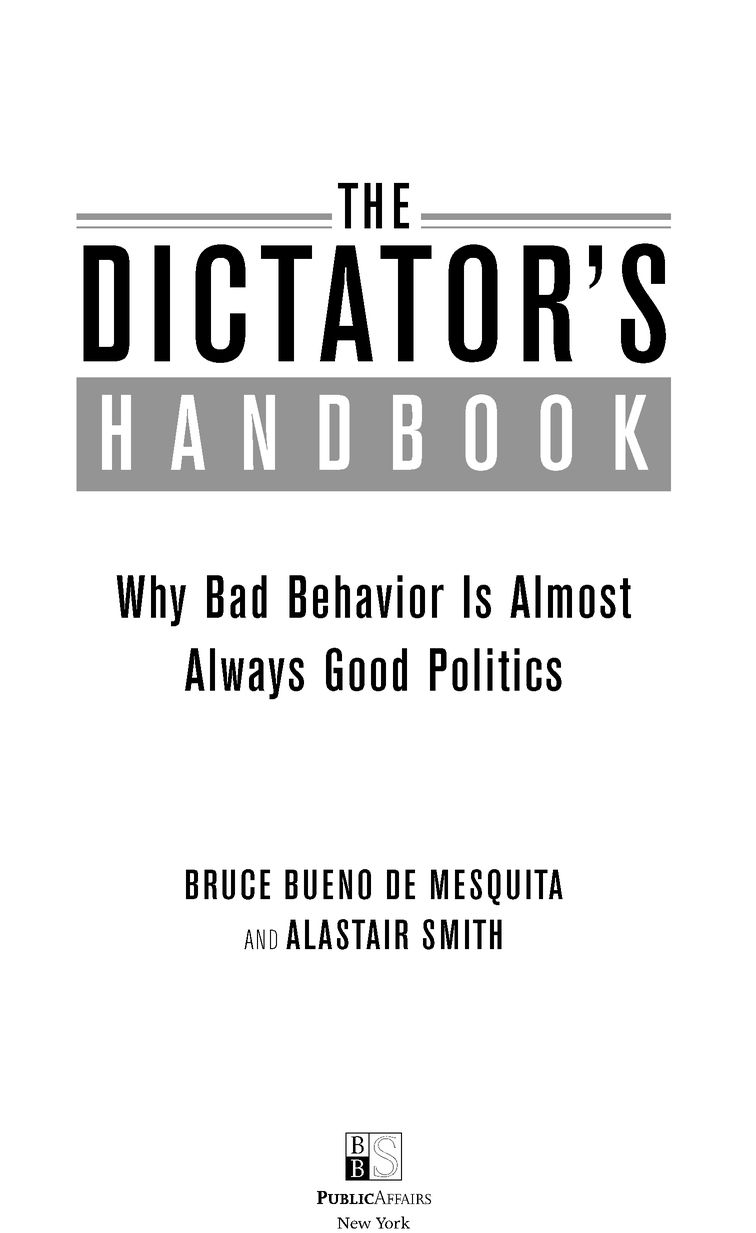The Dictator's Handbook
Read The Dictator's Handbook Online
Authors: Bruce Bueno de Mesquita



Table of Contents
Â
Â
Â
Â
Â
Â
Â
Â
Â
Â
Â
Â
To our dictators, who have treated us so wellâ
Arlene and Fiona
Arlene and Fiona
What is important here is cash. [A] leader needs money, gold and diamonds to run his hundred castles, feed his thousand women, buy cars for the millions of boot-lickers under his heels, reinforce the loyal military forces and still have enough change left to deposit into his numbered Swiss accounts.
âMOBUTU SESE SEKO OF ZAIRE, PROBABLY APOCRYPHAL
Â
Â
Â
Â
Men at some time are masters of their fates. The fault, dear Brutus, is not in our stars, but in ourselves, that we are underlings.âWILLIAM SHAKESPEARE,
Julius Caesar
(I, II, 140-141)
Julius Caesar
(I, II, 140-141)
Introduction
Rules to Rule By
What remarkable puzzles politics provides. Every day's headlines shock and surprise us. Daily we hear of frauds, chicanery, and double-dealing by corporate executives, new lies, thefts, cruelties and even murders perpetrated by government leaders. We cannot help but wonder what flaws of culture, religion, upbringing, or historical circumstance explain the rise of these malevolent despots, greedy Wall Street bankers, and unctuous oil barons. Is it true, as Shakespeare's Cassius said, that the fault lies not in the stars but in ourselves? Or, more particularly, in those who lead us? Most of us are content to believe that. And yet the truth is far different.
Too often we accept the accounts of historians, journalists, pundits, and poets without probing beneath the surface to discover deeper truths that point neither to the stars nor to ourselves. The world of politics is dictated by rules. Short is the term of any ruler foolish enough to govern without submitting to these rules to rule by.
Journalists, authors, and academics have endeavored to explain politics through storytelling. They'll explore why this or that leader seized power, or how the population of a far-flung country came to revolt against their government, or why a specific policy enacted last year has reversed the fortunes of millions of lives. And in the explanations of these cases, a journalist or historian can usually tell us what happened, and to whom, and maybe even why. But beneath the particulars of the many political stories and histories we read are a few
questions that seem to emerge time after time, some profound, some seemingly minor, but all nagging and enduring in the back of our minds: How do tyrants hold on to power for so long? For that matter, why is the tenure of successful democratic leaders so brief? How can countries with such misguided and corrupt economic policies survive for so long? Why are countries that are prone to natural disasters so often unprepared when they happen? And how can lands rich with natural resources at the same time support populations stricken with poverty?
questions that seem to emerge time after time, some profound, some seemingly minor, but all nagging and enduring in the back of our minds: How do tyrants hold on to power for so long? For that matter, why is the tenure of successful democratic leaders so brief? How can countries with such misguided and corrupt economic policies survive for so long? Why are countries that are prone to natural disasters so often unprepared when they happen? And how can lands rich with natural resources at the same time support populations stricken with poverty?
Equally, we may well wonder: Why are Wall Street executives so politically tone-deaf that they dole out billions in bonuses while plunging the global economy into recession? Why is the leadership of a corporation, on whose shoulders so much responsibility rests, decided by so few people? Why are failed CEOs retained and paid handsomely even as their company's shareholders lose their shirts?
In one form or another, these questions of political behavior pop up again and again. Each explanation, each story, treats the errant leader and his or her faulty decision making as a one-off, one-of-a-kind situation. But there is nothing unique about political behavior.
These stories of the horrible things politicians or business executives do are appealing in their own perverse way because they free us to believe we would behave differently if given the opportunity. They liberate us to cast blame on the flawed person who somehow, inexplicably, had the authority to make monumentalâand monumentally badâdecisions. We are confident that we would never act like Libya's Muammar Qaddafi who bombed his own people to keep himself in power. We look at the huge losses suffered under Kenneth Lay's leadership by Enron's employees, retirees, and shareholders and think we aren't like Kenneth Lay. We look at each case and conclude they are different, uncharacteristic anomalies. Yet they are held together by the logic of politics, the rules ruling rulers.
The pundits of politics and the nabobs of news have left us ignorant of these rules. They are content to blame the doers of evil without inquiring why the worlds of politics and business seem to succor miscreants or to turn good people into scoundrels. That's why we are still asking the same old questions. We're still surprised by the prevalence
of drought-induced food shortages in Africa, 3,500 years after the pharaohs worked out how to store grain. We're still shocked by the devastation of earthquakes and tsunamis in places like Haiti, Iran, Myanmar, and Sri Lanka, and by the seemingly lesser intensity of such natural disasters in North America and Europe. We're still troubled by the friendly handshakes and winks exchanged between democratic leaders and the tyrants that they somehow justify empowering.
of drought-induced food shortages in Africa, 3,500 years after the pharaohs worked out how to store grain. We're still shocked by the devastation of earthquakes and tsunamis in places like Haiti, Iran, Myanmar, and Sri Lanka, and by the seemingly lesser intensity of such natural disasters in North America and Europe. We're still troubled by the friendly handshakes and winks exchanged between democratic leaders and the tyrants that they somehow justify empowering.
In this book, we're going to provide a way to make sense of the miserable behavior that characterizes manyâmaybe mostâleaders, whether in government or business. Our aim is to explain both good and bad conduct without resorting to ad hominem claims. At its heart, this will entail untangling the reasoning and reasons behind how we are governed and how we organize.
The picture we paint will not be pretty. It will not strengthen hope for humankind's benevolence and altruism. But we believe it will be the truth and it will point the way to a brighter future. After all, even if politics is nothing more than a game that leaders play, if only we learn the rules, it becomes a game we can win.
To improve the world, however, all of us must first suspend faith in conventional wisdom. Let logic and evidence be the guide and our eyes will be opened to the reasons why politics works the way it does. Knowing how and why things are as they are is a first, crucial step toward learning how to make them better.
Bell's Bottomless BluesIn politics, as in life, we all have desires and contend with obstacles that keep us from getting what we want. A government's rules and laws, for example, limit what we can do. Those in power differ from the rest of us: they can design rules to their advantage and make it easier for them to get what they want. Understanding what people want and how they get it can go a long way to clarifying why those in power often do bad things. In fact, bad behavior is more often than not good politics. This dictum holds up whether one governs a tiny town, a mom-and-pop business, a megacorporation, or a global empire.
Let's start with a tale of a small town's team of seemingly greedy, grasping, avaricious louts so that we can appreciate how the world looks from a leader's perspective. And yet it's vital that we remember that this is a story about politics, not personality. Whether we're discussing a cabal of corrupt reprobates or not, what really matters is that these are people who value power and recognize how to get it and keep it. Soon enough we will come to appreciate that this small tale of miserable conduct recurs at every level of politics and corporate governance, and that there is nothing out of the ordinary in the extraordinary story of Bell, California.
Robert Rizzo is a former city manager of the small town of Bell (population about 36,600). Bell, a suburb of Los Angeles, is a poor, mostly Hispanic and Latino town. Per capita income may be as low as $10,000 or as high as $25,000âestimates varyâbut either way it is way below both the California and national average. More than a quarter of the town's hard-working people live below the poverty line. Life is not easy in Bell.
Other books
Frozen by Erin Bowman
The Earl's Daughter by Lyons, Cassie
Skinny Island by Louis Auchincloss
Scarborough Fair and Other Stories by Elizabeth Ann Scarborough
Lines in the Sand (Crossing The Lines #0.5) by Sc Montgomery
Naming Day (Jake Underwood Book 1) by Michael Ruger
Christmas in Bruges by Meadow Taylor
For Sale Or Swap by Alyssa Brugman
The Second Coming of Mavala Shikongo by Peter Orner